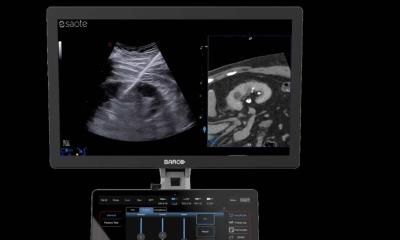A Plethora of Techniques‘ emerging for thoracic intervention
“On a day-to-day basis, each of us in thoracic imaging is dealing with a large number of
patients with pulmonary metastasis or lung cancer,” said Christoph Engelke, MD. “These
patients have been targeted by different chemotherapies and surgical therapies. Yet the
prognosis in advanced lung cancer stages has not been changed.”

“After many years of only modest improvement in oncological therapies available for lung cancer and other malignant pulmonary lesions,” Engelke continued, “the field of interventional thoracic oncology is rapidly progressing with the introduction of a plethora of minimally invasive local treatment options, such as percutaneous radiofrequency, or microwave ablation, and their endovascular counterpart of embolotherapy via bronchial arteries.”
As Vice Chairman of the Department of Radiology and Interventional Radiologist at the University Hospital Goettingen in Germany, Engelke will moderate a session at ESTI 2012 dedicated to Thoracic Intervention with a focus on treating cancer and chronic obstructive pulmonary disease. “There are now percutaneous and endovascular techniques available that I anticipate to become household names in multimodal tumor therapies in the near future,” he said. The session will familiarize with basic technical aspects, current roles and trends of these new treatments.” Two techniques for pulmonary thermal ablation will be presented by Benoit Ghaye, MD, from the University Clinic St-Luc in Brussels. (See story in ESTI Times): Radiofrequency Ablation (RFA) for Secondary Lung Tumors and Ablation by Microwave (MWA) for Early Stage Lung Cancers.
While MWA has demonstrated advantages in local efficacy at lower complication rates, Engelke said, prospective clinical trials are required to further explore this technique, and especially to identify specific patient groups who will benefit from the treatment. The role of pulmonary trans-arterial embolization via the bronchial arteries will be presented by Katarina Malagari, MD, Professor of Radiology at Athens University. After covering technical aspects with classical application in patients with major haemoptysis, transarterial chemoembolization, using drug-eluting microspheres, will cover the oncological aspect of her current work.
“This is a very interesting development,” said Engelke. Bronchial artery embolization has been around for decades. The introduction of drug-eluting beads that have proven efficacy in the treatment of hepatocellular carcinomas, sparked a renewed interest in this technique as multimodal tumor treatment. “Currently the only available drug for transarterial lung cancer embolization, using drug-eluting beads, is irinotecan. “Endovascular specialists are particularly interested in new developments on the sector of drug-eluting beads for delivery of labeled/targeted therapies more directly to tumor cells.”
Professor Gilbert Ferretti, Head of Thoracic Imaging at the University of Grenoble in France, will introduce bronchoscopic interventional management in patients with chronic obstructive pulmonary disease who suffer significant regional emphysema. These patients can significantly improve to maintain sufficient pulmonary function levels. The patient selection, technical prerequisites, and current status of clinical results with respect to surgical treatment options, are presented.
Profile
Professor Christoph Engelke graduated at Hannover Medical School and had his radiological training at Guy’s and St. Thomas Hospitals in London, a Fellowship in Interventional Radiology at St. George’s Hospital, and at the Technical University Munich. He has clinical and research interests in vascular thoracic and in interventional radiology; he is Vice Chairman of the Department of Radiology at the University of Göttingen. He has a daughter and loves classical music
25.06.2012





